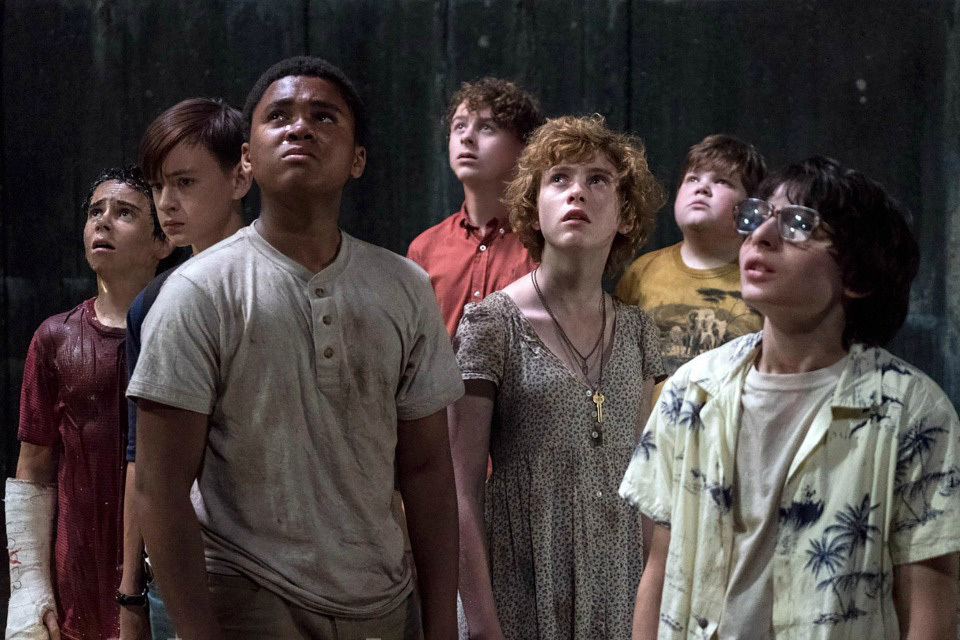
The ’80s are having a moment. First, the Netflix series Stranger Things, which is set in the ’80s and borrows liberally from Spielberg, was a massive hit. Now comes the similarly Spielbergian It, based on the first part of Stephen King’s novel about a killer clown terrorizing a small town in Maine, that is tearing up the box office.
It, which is directed with just the right blend of sweetness and menace by Andy Muschietti, feels like an ’80s movie in every possible way. It borrows, not just from Spielberg, but from De Palma (Carrie in particular), and also evokes other ’80s hits like Goonies and The Explorers and Stand By Me (which was also written by King). Watching the film made me nostalgic for the films I loved in my own childhood, but it also gave me a slight pang of jealousy and regret. All those films were so much about boys—about mythologizing male friendship and, in particular, celebrating the wise-cracking, nerdy, potty-mouthed bond among smart and sensitive outcasts (the kind of boys who would go on to become writers and filmmakers). The boys in It are 13, still children in a way, but trying on the language and attitudes of adults. It captures this wonderfully—as wonderfully as Stand By Me did, although perhaps not quite as well as my beloved Freaks and Geeks (another ’80s throwback that came out in 1999). Yes, there’s a girl in It—the tough and sweet Bev, played by the terrific Sophia Lillis, who’s explicitly channeling ’80s teen queen Molly Ringwald—but she’s treated as a rarefied creature. There’s an (adorable, to be honest) scene where the young heroes are cooling off on the rocks after swimming in the quarry. Bev is lying there, in her underwear and they are gazing at her, with nascent lust, but really more awe and disbelief: How did we get so lucky to be in the presence of this girl?
Anyway, did I mention there was a killer clown? His name is Pennywise, and he is played with giddy malevolence by Bill Skarsgård. Thanks to some unspecified curse, Pennywise appears in the small town of Derry once every 27 years, leaving a trail of missing and traumatized children in his wake.
When the film begins, we meet tiny Georgie, who has been given a handmade boat by his older brother Bill (Jaeden Lieberher). It’s raining outside and Georgie, dressed in the most innocent yellow rain slicker imaginable, follows the boat as it whirs down the street. Then the boat falls into a storm drain. As Georgie crouches in dismay, a pair of gleaming eyes—attached to a grotesque clown face—beckons Georgie closer. Then the clown bites off Georgie’s arm (yes, we see it) and pulls him into the sewer. Fast forward a few months and the summer is about to begin. Bill is in mourning—and in a bit of denial, too; he’s convinced Georgie is still alive. His group of friends—the so-called Loser Club—include the insult comic Richie (Finn Wolfhard), the hypochondriac Eddie (Jack Dylan Grazer), and the cautious rabbi’s son, Stanley (Wyett Oleff). Later, they are joined by the aforementioned Bev, who has an unearned rep for being a “slut;” the chubby, smart, and sweet new kid Ben (Jeremy Ray Taylor, totally lovable); and the “home schooled” kid Mike (Chosen Jacobs), the only black child in the cast.
As more and more children disappear, it’s Bill who wants to go after Pennywise, which is believable. He says that his own home, which is still haunted by Georgie, metaphorically speaking, is more scary than any evil clown. We can accept that Bill might want to do some dangerous things in the name of closure and justice—but it’s a little far-fetched that his friends, no matter how loyal, would follow him into sewers and wells and haunted houses. But again, this is a film about mythologizing boyhood. These boys—and, yes, one girl—know that if they don’t save the town nobody will.
Which leads me to the parents. It shares another thing in common with ’80s films—the parents are useless, distracted, or much worse. We find out terrible things about the parents of both Bev and young Eddie. Even the vicious town bully (Nicholas Hamilton) has a monstrous father—which at least partly explains his sadism.
Of course, it makes sense that the kids have to save the town, since they’re also the only ones who see Pennywise and his various chilling incarnations. Since Pennywise feeds on fear, he always first appears in the form of the child’s greatest nightmare—for Bev it’s blood (she’s just gotten her period); for Eddie, it’s a leper; for Richie, it’s a room full of clown dolls; Bill keeps seeing Georgie.
It relies too much on jump scares for my taste, but it is quite scary. (You’ll never look at a slide carousel the same way.) The child cast is uniformly great—I’m personally gratified that the talented Lieberher was able to remove the stink of The Book of Henry so quickly—and I really cared about the friendships. But while It is a good film that is skilled at recreating its milieu, it also made me a little sad. Boys get all the good nostalgia pieces.
